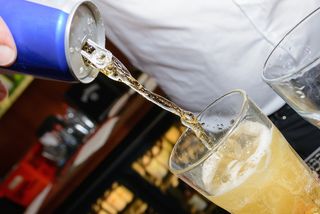Mixing Energy Drinks with Alcohol Causes Brain Changes in Mice

Energy drinks are often combined with alcohol in mixed drinks, and a new study in mice hints at how that combination may change the brain.
In the study, mice that were given energy drinks along with alcohol had changes in their brains similar to those seen in mice given cocaine.
It isn't clear whether the findings apply to humans. But the study suggests it's possible that teens who drink these beveragesin combination might experience similar brain changes, the scientists said. The beverage combination may lead to changes in the brain's ability to respond to rewarding substances, and those changes could last into adulthood, the researchers said. [5 Health Problems Linked to Energy Drinks]
"We're clearly seeing effects of the combined drinks that we would not see if drinking one or the other," study co-author Richard van Rijn, an assistant professor of medicinal chemistry at Purdue University, said in a statement. "It seems the two substances together push [adolescent mice] over a limit that causes changes in their behavior and changes the neurochemistry in their brains."
Energy drinks, which are frequently marketed to teens, can contain up to 10 times the amount of caffeine as an equal amount of soda, according to the researchers. But scientists know little about how these drinks might affect teens' health, they said.
In the study, the researchers wanted to test the health effects of consuming both alcohol and energy drinks. For ethical reasons, such studies cannot be conducted in human teenagers, so the researchers decided to look at these effects in adolescent mice. [10 Facts Every Parent Should Know About Their Teen's Brain]
In one experiment, the researchers gave one group of mice access to both energy drinks and water, and gave another group access only to water. After a month, they gave all of the mice a choice between drinking water and drinking alcohol. They found no significant differences in how much alcohol these two groups drank.
Sign up for the Live Science daily newsletter now
Get the world’s most fascinating discoveries delivered straight to your inbox.
But then, the researchers conducted a similar experiment, with three groups of mice: Some were given access to a mixture with high levels of caffeine and alcohol, some were given access to only caffeine and some were given access to only alcohol. All of the mice had access to water and food throughout the study.
At the end of the month, the researchers looked at the mice's brains. They found that the mice that drank the mixture of caffeine and alcohol showed increased levels of a certain protein, which is a marker of changes in brain chemistry, compared with the mice that drank either only alcohol or only caffeine.
In the mice that drank the mixture, the levels of this protein marker were similar to those that occur in mice that are allowed access to drugs such as cocaine or morphine.
Then, the researchers exposed the mice to cocaine. They found that the mice that had been given the caffeine-and-alcohol mixture were less sensitive to the pleasant effects of cocaine, compared with the mice that were not given the mixture. In other words, those mice would have had to use more cocaine to feel the pleasant "high" than the other mice would have.
"Mice that were exposed to highly caffeinated alcoholic drinks later found cocaine wasn't as pleasurable," van Rijn said. "They may then use more cocaine to get the same effect."
It seemed that drinking the mixture left the mice "somewhat numb to the rewarding effects of cocaine as adults," van Rijn said.
This finding could have implications for addiction, the researchers said.
More research is needed to confirm the findings. Previous studies of other drugs in mice and in humans have shown that changes in mouse brains triggered by the abuse of these drugs are similar to the changes that occur in human brains, the researchers said. Nonetheless, it remains unclear whether the new findings would occur the same way in humans.
Originally published on Live Science.
Most Popular





